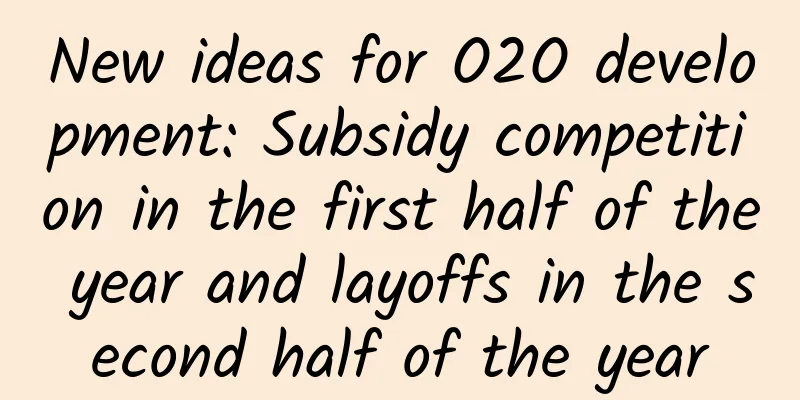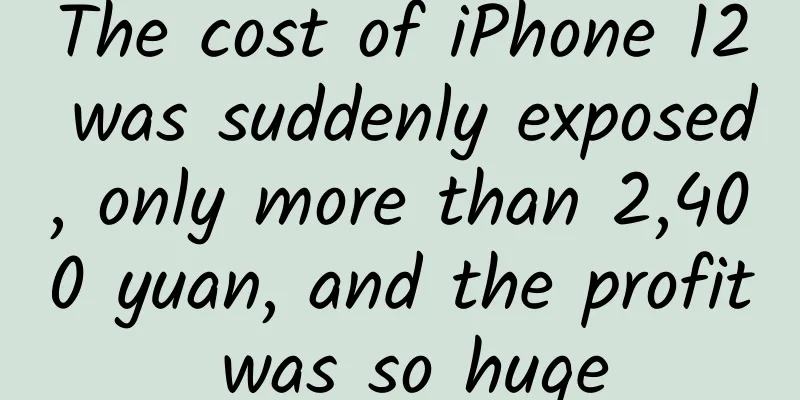New ideas for O2O development: Subsidy competition in the first half of the year and layoffs in the second half of the year

|
Summer has passed, but O2O has not yet reached its harvest period. In the first half of the year, the competition for who can provide higher subsidies was still booming, but in the second half of the year, the competition for who can lay off employees faster began. Dudu Nail Art, 58 Home Nail Art, Ayibang, and Kung Fu Bear have all reported layoffs of manicurists, masseurs, and aunts. The first wave of users attracted by subsidies failed to be converted into loyal customers. After rapid growth, there was an even faster decline. After investigating the O2O industries such as group buying, food delivery, and nail art, the reporter found that the "subsidy sequelae" has appeared to some extent, and more and more companies are no longer burning money, or can no longer afford to burn money. As the capital market cools further, it is inevitable that O2O will usher in a round of reshuffle, but it seems that only in this way can this industry return to its commercial essence and usher in a real spring. Journalist Investigation How are those money-burning O2Os doing now? "Spending money to grab customers" seems to be the only way for O2O. Some industry insiders joked that this is "the wool comes from the pig, and the dog pays the bill." However, when the continued downturn in the global stock market was transmitted to the capital market, O2O companies that originally thought that money would flow in continuously began to feel that life was difficult. Group buying: After several rounds of spending, a lot of troubles remain On a weekend in August, in a commercial district in Pudong, Shanghai, the restaurant chain "Barbera" was doing very well. Through Meituan, you can find that the group purchase during this time period is quite favorable. A new pizza with a menu price of nearly 70 yuan can be bought at 9 yuan through group purchase, becoming a must-order hot-selling item for every table. This restaurant chain has always had a rich group purchase product line. On Baidu Takeaway, "Barbera" also launched a half-price discount for all pizzas. During the peak dining period, the occupancy and order rate here can reach 70%-80%. However, facing the high customer flow, the person in charge of this store can't smile. Behind the seemingly lively subsidies, there is nothing left except customer flow. "Now 100% of the customers who come to the store are here for group buying, but they rarely order dishes other than group buying products." At the same time, since participating in group buying, the average customer price per table in the store has been directly reduced from 155 yuan to 75 yuan. Increasing volume without increasing price, continuing to burn money, but unable to exchange for real benefits, this is an embarrassing result that traditional merchants who have cooperated with group buying for many years can never escape. Group buying, as one of the earliest models of O2O, has not yet found the most suitable development path when it is about to enter its fifth year of development. The long-term money-burning war has made group buying websites and merchants very exhausted. Meituan, a landmark company in the group buying field, has recently fallen into "valuation doubts". On the one hand, the media disclosed that Meituan's latest round of financing has progressed to the later stage, with a total financing amount of between US$1.5 billion and US$2 billion. After this round of financing, Meituan's valuation will exceed US$10 billion; but on the other hand, there are also reports that Meituan's valuation has dropped from US$15 billion to US$10 billion. Manicure: I've been doing it for half a year and I can't stand it anymore "58 Home Nail Art is hiring a large number of manicurists." At the beginning of the year, Zhang Jun (pseudonym) wrote a recruitment notice in his QQ signature column. Now things have changed. Less than half a year later, he left this dreamy O2O project. The madness at the beginning of the year is still vivid in my mind: a manicurist with good skills can get a basic salary of 4,000 yuan as long as he joins the 58 Home Nail Art platform. With commissions, the highest monthly income can reach tens of thousands of yuan. With free time and increased income, it seems like a perfect entrepreneurial dream. However, with the expansion of O2O platforms and the increasing number of nail technicians, business began to become more crowded. "Originally one person did four or five orders, but now four or five people compete for one order." As a result, not only did the basic salary disappear, but the nail technicians also had to pay the platform a 20% management fee. This gorgeous performance ended before it was fully enjoyed. Now, Zhang Jun has left Shenzhen and lives a stable life in a nail salon in his hometown. In Nanjing, there are still a group of manicurists struggling. The 9-yuan door-to-door manicure products seem to be booming, but the team of manicurists is quietly disintegrating. "Except for promotional activities, there are basically no orders, so the guaranteed salary can't be kept." Xiaolin, a manicurist at Nanjing 58 Home Manicure, doesn't know how long she can hold on. Now the company requires them to complete 100 orders per month, and the shortfall will be deducted from the 3,000-yuan guaranteed salary. For manicurists who fail to meet the standards for a long time, they will also face the dilemma of being forced to sign a "no guaranteed agreement." Nail art O2O, which was once considered a high-frequency consumption, has been reported to have large-scale layoffs several times. Previously, 58 Daojia had boasted that it would spend 100 million yuan on door-to-door nail art services, but now it has begun to quietly promote no-guarantee wages in different regions. Dudu Nail Art, which started the earliest in the vertical field, was also exposed on Weibo that it was promoting large-scale layoffs in its Chengdu area. When the reporter of "IT Times" asked the platform for confirmation, the other party did not give a positive response. However, after the A round of financing, Dudu Nail Art has never completed new financing. Large-scale user subsidies, coupled with heavy human capital, make it difficult for nail art O2O to bear the burden. "For nail art products that cost more than 150 yuan, the highest subsidy is more than 100 yuan. It is very expensive to start a city, and it burns about 15 million yuan a month," said Diao Ye, the founder of Helijia, a home beauty and nail art O2O. He admitted that he raised tens of millions of dollars three times a year, but a large proportion of it was "lost." Massage: Conflict between unpaid wages and quality control Not long ago, Kung Fu Bear technicians in Shanghai held up banners to demand their wages. According to media reports, the technicians said that they had previously agreed with Kung Fu Bear to pay their wages on the 10th of each month, but they began to be owed wages in July. There are about 30 technicians in Shanghai who are owed wages, ranging from 1,000 to 2,000 yuan. Kung Fu Bear CEO Wang Run responded that these technicians were found to have quality control problems and their subsidies were cancelled. Kung Fu Bear, the first company to enter the massage O2O field, was recently revealed to be about to complete a B round of financing of tens of millions of dollars. Among the dozens of massage O2O companies on the market, Kung Fu Bear is a new generation that is developing relatively rapidly. Its biggest capital is the industry's largest order volume, but its pace of burning money is also unparalleled. An industry insider has calculated that according to the order price given by Kung Fu Bear, each order for neck and shoulder massage is 128 yuan, and Kung Fu Bear gives masseurs a commission of 80%. The average daily order is 2,000 orders, and the daily payment to masseurs is nearly 200,000 yuan. However, in actual market promotion, Kung Fu Bear subsidizes nearly 100 yuan per order, resulting in actual losses for each order. Previously, Wang Run stated on many occasions that masseurs are directly affiliated with the platform and the platform issues a guaranteed salary. At this pace, Kung Fu Bear will soon burn out the millions of yuan it received in the angel round and the millions of dollars in the A round of financing. Kung Fu Bear told the IT Times that starting from August, Kung Fu Bear will cancel the 7,000 yuan guaranteed "reward" originally given to platform technicians in the first month. In the future, only those who meet the standards in terms of order volume, repurchase rate and praise rate can get the guaranteed reward. In addition, the user subsidy has also been reduced from nearly 100 yuan to a maximum of 40 yuan. Disappearing subsidies Recently, Ms. Zhang, who works in the Changshou Road business district in Shanghai, found that the threshold for Ele.me subsidies is getting higher and higher. The condition for using a 10-yuan coupon is to spend at least 70 yuan, and a 6-yuan coupon must be spent at least 40 yuan... But it is becoming increasingly difficult to save the 7-yuan takeaway fee. On September 17, Ms. Zhang suddenly discovered that the subsidies for Baidu Takeaway had magically disappeared, and no store showed any subsidies. "Is it a system problem, or is Baidu no longer subsidizing?" Taxi driver Master Wei also has to face the reality that Didi’s subsidies have completely disappeared. This subsidy-grabbing expert used to specialize in grabbing orders with subsidies. When business was good, he could earn 100 to 200 yuan in subsidies every day. However, Didi’s subsidies have become less and less, and finally disappeared completely in recent weeks. But he does not intend to give up using Didi, because this platform has cultivated the habit of tipping for many passengers. Now his goal is to grab “tip” orders. On rainy days and during rush hours, he can earn 40 to 50 yuan in tips. Sheng Qiang is an Ele.me rider in the Changshou Road business district in Shanghai. When a user asks him why the platform subsidies are reduced, he always answers confidently, "Our time efficiency is even higher." Before that, his basic salary was 3,000 yuan per month, and he received a commission of 5 yuan for each order he delivered. With the opening of breakfast and afternoon tea business lines by Ele.me, Sheng Qiang can do dozens of orders a day, with a monthly income of 6,000-7,000 yuan. Although Ele.me is slowly lowering subsidies on the user side, Sheng Qiang has not felt a significant decline in the number of users. After Ele.me recently launched a membership system, Sheng Qiang has another source of income - selling memberships, 35 yuan per quarter, 120 yuan per year, and a commission of 9 yuan per order (annual card). If done well, at least 1/3 of the customers are willing to apply for a card among dozens of orders a day, which may become his new source of income in the future. Further reading What to do with O2O that has no money to burn? "In the absence of actual profit performance, investors can only look at order volume and user activity. In order to strive for a higher ranking, O2O websites have to spend money. With large subsidies, they stimulate user activity and then raise funds, and the cycle repeats over and over again. However, many companies do not have time to think about what to do after users come in." Xu Chen, partner of Gobi Ventures, believes that this is the "unspoken rule" of the O2O industry. The traffic brought by spending money cannot bring barriers and commercial value, and it is difficult for a company to develop healthily. Money is no longer given to users but to build the platform itself For O2O companies that are still burning money but have a hard time seeing the future, time is running out. Since the second half of the year, the investment circle has been watching O2O financing projects. For O2O projects that are burning money and grabbing land, the financiers have generally expressed concerns. Taking Tuina O2O as an example, Tuina Lion, Dian Miaoshou, etc. have only obtained A round of financing, and Jiu A Ge, Tuitui Xiong, etc. have only obtained angel round financing. The sluggish financing environment will directly affect the pace of burning money. "Those who rely solely on capital investment and burning money in the second half of the year will find it difficult to survive." Xu Chen believes that under the background of capital tightening, both large and small platforms need to rethink where they will go. "We hope to seek a healthy ecosystem that grows on its own." Ele.me officials did not deny the gradual reduction of lunch subsidies. In their plan, subsidies will no longer be the focus of burning money, but will further become a lever for "regulating" customer flow. "For example, if you book lunch before 10:30, we will subsidize 2 yuan, because 'booking in advance' can improve efficiency, avoid mistakes and duplication of work in the restaurant kitchen during peak hours, and reduce the time users have to wait for meals during peak hours." In addition, subsidies will also appear in more innovative projects, such as breakfast, afternoon tea, and supper product lines. The launch of the new system also requires appropriate subsidies to stimulate merchants and users to use it and accelerate product iteration. As for the huge financing of US$630 million just received, more will be invested in the newly established "instant delivery platform". "As the basic project of home delivery service, the delivery system is huge and requires a lot of capital investment." They are ready to burn out an "ecological system" with money. In addition to the logistics system, they will also focus on the traffic platform and cloud big data platform that serve e-commerce, provide basic logistics, traffic and big data services to the entire O2O industry, and finally complete the e-commerce ecology of the service industry, which is quite similar to the model of JD.com burning money at the beginning. Entering the second half of the year, a group of O2O industry pioneers such as Didi, Ele.me, and Beaver Home began to think about how to allow the model to grow on its own through the operation and maintenance of the ecological system. Low-frequency and profitable O2O starts to heat up slowly "Previously, O2O projects with high consumption frequency and low average order value were the focus of investors' investigation, because investors value rapid development and quick profits." In Xu Chen's view, after entering the second half of the year, more and more investors have begun to realize that the so-called high frequency is just an illusion, a special demand stimulated by high subsidies, and the slow but stable O2O entrepreneurial projects that have been neglected will attract attention again. "Relative to subsidizing users, we invest more money in the training of supervisors." Recently, the home improvement O2O "Tubatu", which is not very well-known to the outside world, quietly completed a C round of financing of up to 200 million US dollars. This year is the eighth year of their establishment. Compared with the current rate of three rounds of financing per year for high-frequency O2O, such a pace is difficult to satisfy investors. But this year, this old entrepreneurial team is particularly active, because they have been profitable since the beginning of the year, and the daily order volume has exceeded 36,000. In the previous eight years of burning money, most of the funds were used for personnel training. At present, Tubatu has established a set of its own supervision system. In addition to the fact that the decoration payment finally delivered by the user shall not exceed 5% of the budget, they set up six supervisors in stages to ensure the quality and progress of the decoration for the entire project. Li Jian, CEO of Renrenche, which recently completed a 78 million yuan financing, also expressed a similar view: in low-frequency and high-priced O2O projects such as used cars, simply burning money to subsidize users is far less efficient than building one's own "wall", such as building a more reliable valuation and transaction system. In the view of industry insiders, the value of O2O projects that come from rigid demand markets such as decoration and aftermarket and are more focused on operations will receive renewed attention, and the return of these projects itself represents that the capital market will become more rational. "People are beginning to realize that the core of O2O is to balance the development of traditional business and Internet business, and the previous money-burning game is more about stifling traditional business rather than promoting it," analyzed an industry insider. Under the influence of the overall environment, O2O will enter a deeper integration before the end of the year, a number of O2O startups will exit the market, and the cost of ineffective competition among the remaining high-quality O2Os is expected to decrease. They will truly return to the essence of business and usher in a new spring. |
<<: APICloud supports Sublime, Webstorm, and Eclipse to develop cross-platform apps
>>: Ten sets of Apple big data that shocked foreigners
Recommend
Elements and channels of product promotion plan!
The general promotion process is as follows: 1. M...
"Fruit corn", "Fruit carrot", "Fruit cucumber"... Are they just gimmicks? Here's how to choose vegetables →
Have you seen many vegetables labeled as fruits i...
Detailed explanation of Google search ads display formats!
There are generally three types of Google ads: se...
Understand iQiyi’s regional brand marketing in one picture!
In the era of big screens, smart TVs are highly p...
Why are cases still high as the weather gets warmer? Does temperature affect the activity of the virus?
It is the season of spring again, when flowers bl...
Xiaomi Note is a touchstone for testing the authenticity of fans
After the release of Xiaomi Note, a great debate ...
ToB products: How to use live streaming to achieve fission + conversion?
Many friends asked us how we achieve conversions ...
What are the design differences between Android and iOS? Here are 7 differences summarized by experts!
Since most mobile devices used by designers and p...
Why your phone needs a more powerful AI processor
Three years ago, AI became a new selling point fo...
iPhone 6 locked remotely: Don't use it if you don't pay
I just bought an iPhone 6, but it was suddenly lo...
Polestar cuts 15% of its global workforce, Geely Auto's multi-brand globalization strategy faces challenges
Swedish electric car maker Polestar said recently...
Don’t keep posting about Mercury retrograde on your Moments! You can’t blame Mercury for your bad luck
Hello everyone, I am Mercury, the most wronged pl...
Frontline of Epidemic Prevention | Is the ninth edition of the prevention and control plan still effective? Can vaccination wait? ... The authoritative answer is here!
On August 10, the Joint Prevention and Control Me...
See the strong insertion of AspectJ in Android
What is AOP AOP is the abbreviation of Aspect Ori...
Financial confession from a former Xiaomi employee: I am confused about how to deal with options
I graduated from a 985 university in Beijing, and...









